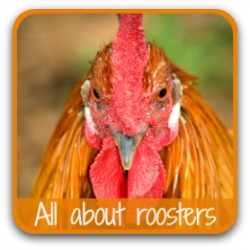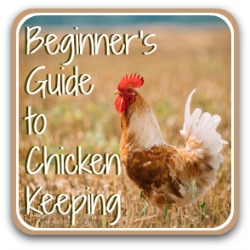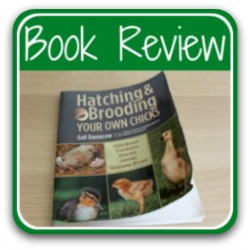Why have a rooster in your flock? Here are 5 good reasons.
Please note: the word for a male chicken in some places, including the UK, is "cockerel". In other places, "cockerel" refers only to males less than a year old. For ease of reference here, I'll refer to them all - whatever age - as "roosters" or "roos", which is the common American name.
If you're thinking of introducing a rooster to your backyard flock, you'll find a lot of people - in life and online - telling you not to.
There may be a good reason for you not to. It may be against the law, for example.
But just to balance the books, let's take a look at why having a male amongst your hens can be a definite advantage. Then you're in a proper position to make a decision.
1. Colours.
OK, so it's perhaps not the best reason, but let's be honest - roosters can look absolutely stunning.

When the sun catches their colours, it can make them seem iridescent. They add so much vibrancy to the chicken run.
Isn't that a good enough reason?
No? Oh. Well, read on and let me try to persuade you...
Do you have a stunning roo whose photo and story you'd like to share with us? Take a look here to find out how you can!
2. Roosters + hens = chicks!
A hen without a rooster will still lay eggs. But an egg without a rooster will never become a chick.
Just the same as in the human world, it takes a male and a female to create a fertilised egg which can, if given the proper conditions, turn into a chick.
Not convinced? See this article for more myth-busting facts about fertile chicken eggs.
So if you have a longing to breed chicks from your own flock, you'll need a male to do it. It's one of the main reasons backyard chicken keepers have a roo (or two) in their flock.
Of course, there are some drawbacks for your hens - see this article for more information about that - but they're manageable.
 Without a roo, this idyllic scene would not have existed!
Without a roo, this idyllic scene would not have existed!And who doesn't like having a few home-grown chicks around the yard?
3. They keep a balance in the flock.
You'll have heard of the pecking order. It's what happens between chickens in the same flock. There's a hierarchy of dominance, and those who are at the top of the pecking order can become quite brutal with others lower down.
It can go so far as a hen, particularly if she's ill or injured, being attacked mercilessly - sometimes even to death. You wouldn't think it of hens - such peaceable, quiet creatures as they are.
But it doesn't always work that way.
Having a male in the flock can help balance that pecking order since, in the male-dominated world of nature, roos are always at the top.
No argument.
 Balance and tranquility are helped along by having a rooster with the hens.
Balance and tranquility are helped along by having a rooster with the hens.4. Roosters will defend their flock against all comers.
That's what their "aggression" is about. Male chickens are aggressive only because they are doing their job.
Their job is to defend their flock, and instinctively they'll do it even against the most fearsome of predators.
I've seen one of mine try to defend the hens from what he perceived as a huge threat. A fearsome green snake...
Actually, it was a hose pipe, but that's beside the point! He was still prepared to protect till death.
 Roosters will defend their flock - even if it's only against a hose pipe!
Roosters will defend their flock - even if it's only against a hose pipe!Roosters have been known to protect their hens against birds of prey and even coyotes. A good roo will always put himself in the front line first.
So, if you want your hens to be protected against predators at all times - and remember, you can't be with them 24/7 - you need a male in your flock.
5. Roosters crow!
Many people would see this as a problem. Personally, I love it.
Ever noticed that roosters will crow at more or less everything? Morning, evening, when it's sunny, when it rains... And to more or less any stimulus? The sound of a car engine, for example?
It's not just a random happening. They crow for reasons. Mostly, it's to make sure other roosters know it's their territory. It's one of the ways they use to protect their hens.
Similarly with car engines or any other strange noise - they assume it's the sound of either a rival or a predator. Either way, it's time to crow.
So next time you hear an ear-splitting crow, remember: he's letting you know this is his land.
As far as he's concerned, no-one else is allowed in - and that may include you.
 Rooster crow: love it or hate it, if you're going to have a roo you'll have to live with it!
Rooster crow: love it or hate it, if you're going to have a roo you'll have to live with it!It may be noisy. It may be a sound that your local officials don't want to hear. It may be a sound your neighbours object to.
But for many of us, it's one of the most joyful sounds in the world.
What's your view? And what would your family and your neighbours say?
And now...
Tell us the story of your roo!
Don't hold back! Just tell your story from the heart. What he's like, why he's special, how he treats his hens, how he treats you! Anything you want to tell the world!
Take as long as you like - there's no word limit. In fact, the more details you can give, the more meaningful your story will be both for you and for other people.
Stories which have fewer than 500 words will be published on a shared page with other people's stories. If you write over 500 words, your tribute will have its very own page.
Use the ? link at each section if you need more help.
Please note: I can't accept stories from children under the age of 16 for legal reasons. If you want to leave a story and you're younger than that, please ask your parents or guardian to help you write it.
Take a look at other people's roos!
There are so many different roosters in this world - some caring and friendly, others - not so much!
Take a look at these stories of other people's roos.
Tales of Marshmallow the brave 




We have an Isa brown rooster named Marshmallow. He is creamy white with attractive brown bars on his wings and back. He is a little aggressive, but he …
More stories of roosters in the flock. 




I have a Silkie roo and he is bullying my ducks what should I do I put him in isolation yesterday because I noticed blood on my female ducks wing and I’m …
Rudy the rooster and the herding oar 




To begin, I've only raised chickens for 2 years. Got the babies at tractor supply store. I knew nothing. Read everything about them. I didn't realize …
My buddy Zebedee 




A long story. A pal of mine answered an advert for two hens and a house. He asked me to go with him to collect the hens and house which we dismantled …
Short (but very sweet!) rooster stories. 




Hello and thank you for all the information you provide.
Our White sex-linked roo is absolutely wonderful. He will only allow me into the chicken yard …
















